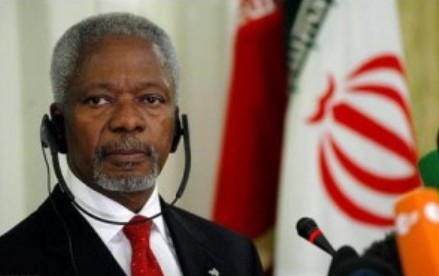 TEHRAN (Dispatches) -- Former UN , head of a group of ex-global leaders known as the Elders, Sunday started a visit aimed at boosting dialogue between Iran and the international community.
TEHRAN (Dispatches) -- Former UN , head of a group of ex-global leaders known as the Elders, Sunday started a visit aimed at boosting dialogue between Iran and the international community.
Annan is accompanied by Martti Ahtisaari, a former president of Finland, South Africa's Nobel Peace Laureate Desmond Tutu and Mexican ex-president Ernesto Zedillo.
The group, formed in 2007, is made up of 12 global leaders who try "to promote peace, justice and human rights", according to its website.
It said the group will hold private meetings with Iranian officials but did not give further details.
They would start the three-day trip by visiting the mausoleum of the late Imam Khomeini, founder of the Islamic Republic.
The group sees "recent positive developments as a historic and strategic opportunity to end decades of animosity" between Iran and the West, the website said in statement.
But it added "trust will only be built slowly, through continued goodwill and reciprocal action".
During the visit, the Elders "will exchange ideas with the Iranian leadership about peaceful ways of addressing conflict and healing sectarian divisions in the region".
Iranian Foreign Minister Muhammad Javad Zarif said on Saturday that he would host the delegation.
Earlier, Annan said Iran had an essential role to play in guaranteeing stability in the Middle East and urged U.S. lawmakers to give a diplomatic detente with Tehran a chance.
Annan's successor as UN chief, Ban Ki-moon, this week issued and then withdrew an invitation to Iran to join international peace talks on Syria in Switzerland.
"If we are going to have peace and stability in the Middle East, it is essential that Iran plays its natural role in the region," Annan, who served as U.N./Arab League envoy to Syria for five months in 2012, told Reuters in an interview at the World Economic Forum in Davos.
Western powers led by the United States co-sponsoring the peace talks insisted that Iran could only sit at the table if it accepted a plan for a transition of power in Syria agreed in 2012, something it has declined to do.
"Washington has its own hardliners who do not believe this is the way to go and are even talking about imposing fresh sanctions in the middle of the (nuclear) negotiations process," Annan said.
"It would lead to a division between Europe and the U.S. I would urge my friends in Washington to think through this before they push ahead," he said. "They should give diplomacy, negotiation and peace a chance."

















